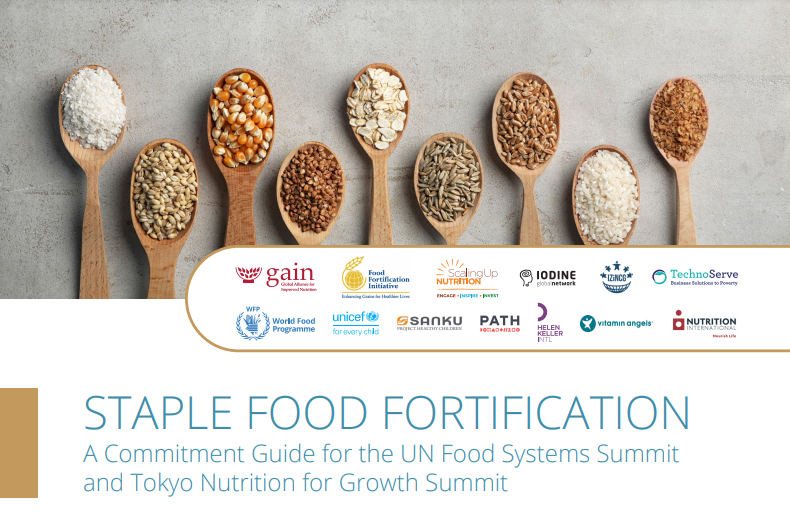in 2021, the UK updated legislation to include folic acid in its mandatory wheat flour fortification standards.
Read MoreThanks to advocacy efforts by FFI and in-country stakeholders, the Ukrainian Parliament drafted a law for wheat flour fortification in June 2021.
Read MoreWith a heavy heart, we share that our colleague Anna Verster passed away on 18 June 2021. For nearly 20 years, Anna provided invaluable insight and expertise as Senior Advisor for FFI. A lifelong advocate for food fortification, Anna’s work in Africa, the Middle East, and Europe has literally left an indelible imprint on the lives of millions.
Read MoreAhead of the UN Food Systems Summit, UN Climate Change Conference (COP26), and Tokyo Nutrition for Growth (N4G) Summit, FFI joined a range of food fortification experts to call on national governments, the private sector and donors to commit to fortification.
Read MoreUsing varied study designs (none of which can confirm causality), a recently published analysis found that after wheat flour fortification was implemented at large scale in countries, many health outcomes were improved.
Read MoreWhen the pandemic made an in-person mill assessment in Tajikistan impossible, FFI took a virtual approach.
Read MoreHalf of the countries that fortify maize and wheat flours with iron, zinc and vitamin B12 may need to update their standards to meet the World Health Organization’s (WHO) current recommendations, according to a recent study published in Food Policy.
Read MoreTo prevent a rise in malnutrition as a result of the pandemic, countries need to maintain food systems and support large-scale interventions like the fortification of staple foods. The frontline of every country’s health system are the immune systems of its people.
Read MoreEurope is often viewed as a part of the world where vitamin and mineral deficiencies are not prevalent, yet certain countries in the region carry a burden at levels that deserve attention.
Read MoreThe John D. and Catherine T. MacArthur Foundation today unveiled the Food Fortification Initiative (FFI) and its partners’ proposal as one of the highest-scoring proposals, designated as the Top 100, in its 100&Change competition for a single $100 million grant to help solve one of the world's most critical social challenges.
Read MoreA Cochrane systematic review on the benefits and safety of fortifying wheat or maize flour with folic acid and population health outcomes, led by scientists in the Division of Nutritional Sciences at Cornell, found that fortification with folic acid (the synthetic form of folate) may improve folate status and reduce the occurrence of neural tube defects.
Read MoreTwo-thirds of all countries mandate food fortification, yet many are not translating policy into improved nutrition, according to new data from the Global Fortification Data Exchange (GFDx) in English or in Spanish (en español). These countries are missing an opportunity to improve the health of children and mothers, bolster communities, and boost national economies.
Read MoreTo prevent a rise in malnutrition as a result of the pandemic, countries need to maintain food systems and support large-scale interventions like the fortification of staple foods. The frontline of every country’s health system are the immune systems of its people.
Read MoreA Cochrane systematic review on the benefits and safety of fortifying wheat or maize flour with folic acid and population health outcomes, led by scientists in the Division of Nutritional Sciences at Cornell, found that fortification with folic acid (the synthetic form of folate) may improve folate status and reduce the occurrence of neural tube defects.
Read MoreThe public policy planning forum that launched what became FFI was on 24 October 2002 in Mauritius. To celebrate our 15th birthday in 2017, we honored 15 fortification champions from different sectors and different parts of the world. An influential person who supports fortification is a key to success.
Read More
















